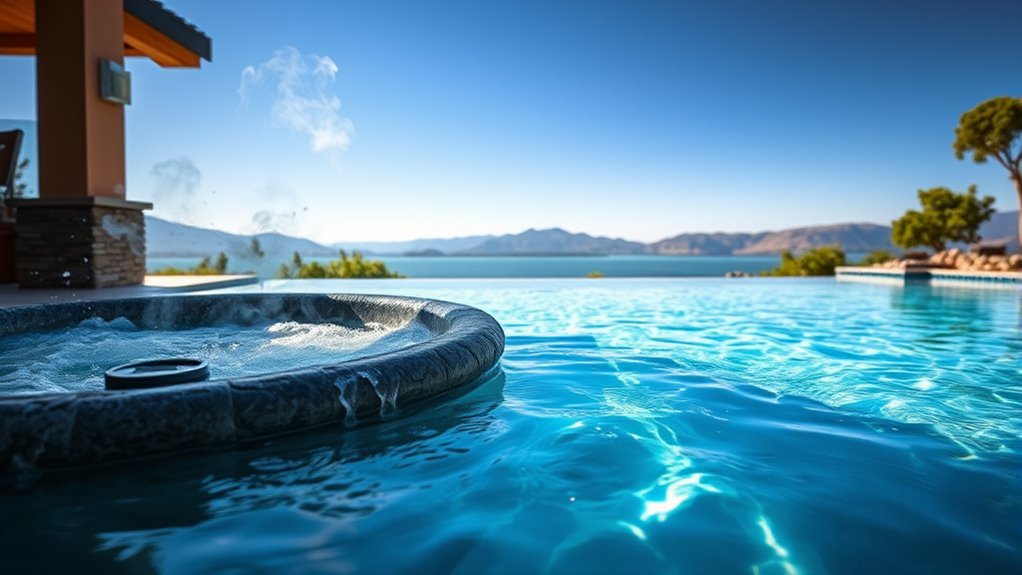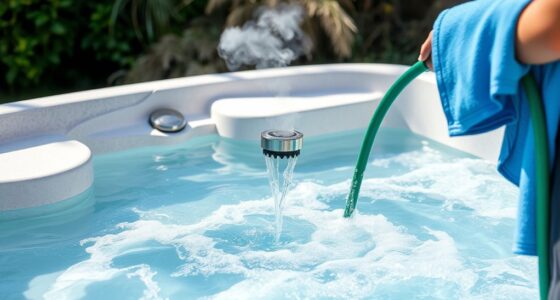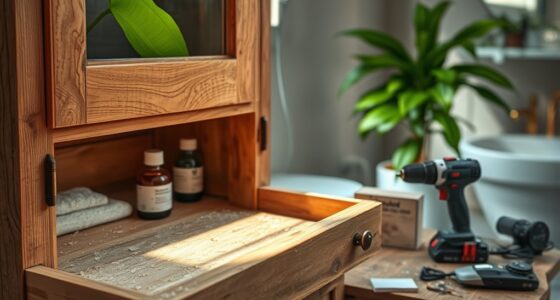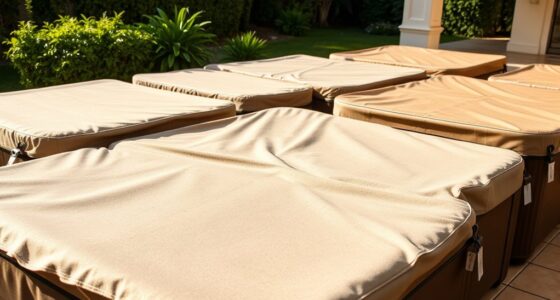When comparing a hot tub and a pool, consider your budget, space, and maintenance needs. Hot tubs are cheaper upfront, easier to install, and perfect for year-round relaxation, but they require regular water treatment. Pools cost more initially and need extensive upkeep, especially in warmer months. Both add value and privacy, but their suitability depends on your lifestyle and long-term goals. Explore further to see which option fits your property and needs best.
Key Takeaways
- Hot tubs have lower upfront costs and easier installation compared to pools, which require extensive groundwork and permits.
- Pools offer larger water spaces suitable for swimming, while hot tubs focus on relaxation and therapeutic jet features.
- Hot tubs demand more frequent cleaning and chemical maintenance due to their smaller size and enclosed design.
- Pools are primarily seasonal, with outdoor use limited to warmer months, whereas hot tubs can be used year-round with temperature control.
- Both features can increase property value, but pools tend to enhance curb appeal more for recreation, while hot tubs appeal to luxury buyers.
Cost and Budget Considerations
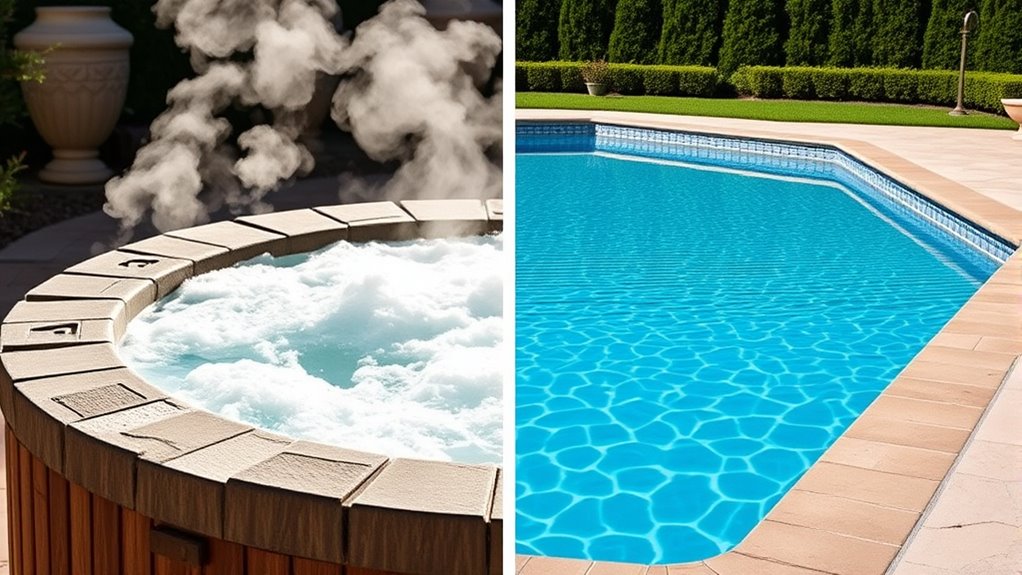
When deciding between a hot tub and a pool, cost and budget are critical factors to contemplate. Hot tubs usually have a lower initial price, making them more affordable upfront. However, they can have higher ongoing expenses due to electricity and water heating costs, especially if you plan to use them frequently. Pools tend to cost more initially, with installation, fencing, and landscaping adding to the price. But their long-term costs might be lower if you’re aiming for regular, large-scale use. Maintenance expenses also vary; hot tubs require regular water treatment and occasional repairs, while pools need ongoing cleaning and chemical balancing. Additionally, the initial installation costs for pools can be significantly higher, influencing your overall budget. Considering the operating costs over time is essential to avoid surprises and ensure your investment aligns with your financial plans. Furthermore, understanding long-term expenses can help you better forecast total ownership costs and make informed decisions. You should assess your budget carefully, considering both upfront costs and ongoing expenses, to make the best financial decision. Additionally, implementing cost-cutting strategies can help manage expenses effectively over time. Being aware of maintenance requirements for each option can also influence your overall budget and satisfaction with your choice.
Space and Installation Requirements

Choosing between a hot tub and a pool also depends heavily on your available space and installation requirements. Hot tubs are compact, fitting comfortably on decks or patios, and usually need a flat, level surface for installation. Pools, on the other hand, require considerably more space, often needing a large yard or open area, with room for surrounding decking or fencing.
Consider these factors:
- A hot tub can be installed on a small concrete slab or deck.
- Pools demand a spacious, level area for digging and setting up.
- Hot tubs typically require minimal excavation.
- Pools may need permits and extensive groundwork before setup.
Your yard size and the complexity of installation will influence which option fits best.
Maintenance and Upkeep
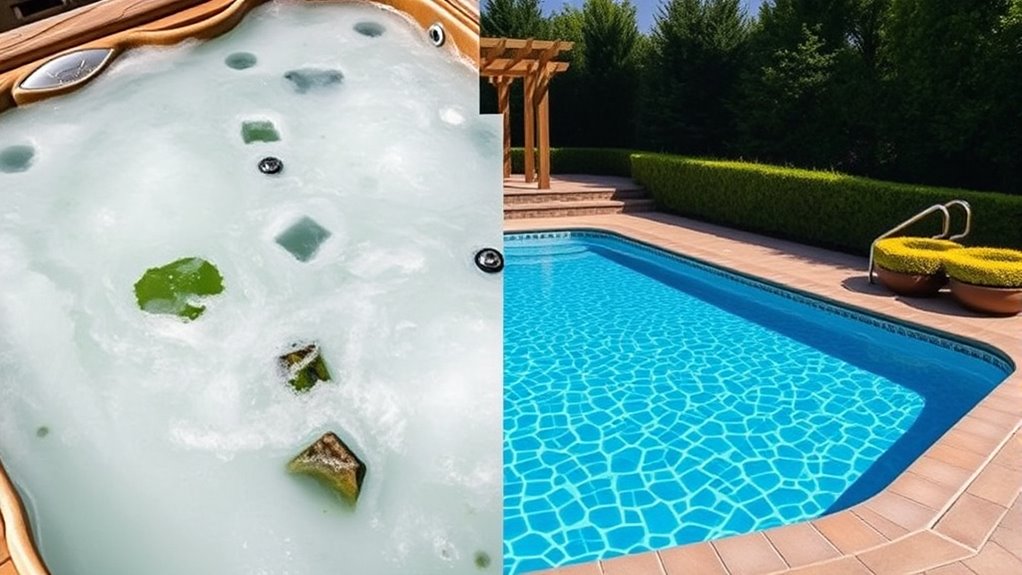
Maintaining a hot tub or pool involves regular cleaning, but the frequency varies. Balancing chemicals can be tricky, especially with hot tubs, which require more precise adjustments. Additionally, repair and replacement costs can add up quickly, so understanding these factors helps you plan for ongoing upkeep. Using adjustable settings on your equipment can help optimize performance and reduce maintenance needs over time. Regular testing of water quality is essential to ensure proper hygiene standards and prevent issues like algae growth or equipment damage. Proper filter maintenance is crucial to keep the water clean and extend the lifespan of your equipment. Monitoring filtration system performance can also help identify potential issues early, saving you money on repairs. As automation and data privacy considerations become more prominent in technology, similar principles of careful management and regular monitoring apply to maintaining your pool or hot tub.
Cleaning Frequency Needs
Hot tubs generally require more frequent cleaning than pools, mainly because their smaller size and enclosed design can lead to quicker buildup of dirt, oils, and bacteria. You’ll need to clean the surfaces, filters, and jets more often to keep the water safe and inviting. This means skimming debris regularly, rinsing filters, and wiping down seats to prevent grime accumulation. In contrast, pools benefit from larger volumes of water that dilute contaminants, reducing cleaning frequency. However, neglecting hot tub cleaning can cause grime to settle quickly, affecting water quality and equipment. To stay on top, you should plan to clean your hot tub at least once a week, especially during heavy use or warm weather. Consistent upkeep ensures your hot tub remains hygienic and ready for relaxing dips.
- Skimming floating leaves and debris
- Rinsing and replacing filters
- Wiping down seats and surfaces
- Removing settled dirt from the bottom
Chemical Balance Complexity
While hot tubs require more frequent cleaning, keeping their water balanced can be even more complex. Hot tub water is smaller and recirculates quickly, making chemical levels fluctuate rapidly. You need to constantly monitor pH, alkalinity, and sanitizer levels to prevent bacteria growth and skin irritation. Imbalanced water can lead to cloudiness, odors, or equipment damage. In contrast, pools have larger water volumes, which allow for more stable chemical levels, but still require regular testing. Hot tubs demand more diligent adjustments, often multiple times a day, especially after use. You must also account for added variables like body oils, lotions, and contaminants. Achieving and maintaining proper chemical balance is a continuous process that directly impacts safety, comfort, and equipment longevity.
Repair and Replacement Costs
Hot tubs typically incur higher repair and replacement costs over time compared to pools. Their complex systems, like jets, heaters, and pumps, are prone to breakdowns, requiring frequent repairs. You might find yourself replacing worn-out parts or upgrading components sooner. The sealed, insulated design also means issues with leaks or insulation damage can be costly to fix. Imagine having to:
- Replace a faulty heater that suddenly stops working
- Repair jets that cease to function properly
- Fix leaks caused by cracked shells or damaged seals
- Upgrade aging pumps to maintain water flow
All these repairs add up quickly, making maintenance more expensive. While pools generally have fewer mechanical parts, hot tubs demand ongoing investment to keep them running smoothly and comfortably.
Temperature Control and Comfort

Your hot tub’s thermostat offers precise control, so you can set your desired temperature easily. In contrast, pools are more affected by outdoor temperatures, making consistent comfort harder to maintain. Understanding these differences helps you choose the best option for your relaxation needs. Additionally, temperature regulation features in hot tubs contribute to maintaining consistent warmth regardless of external weather conditions. Proper environmental monitoring can also help identify if the environment is suitable for relaxation, as auras reflect emotional and physical states that influence comfort. Recognizing the importance of emotional support can further enhance your overall relaxation experience by promoting a sense of well-being in your environment. Utilizing breed-specific traits knowledge can also help tailor your relaxation space to suit your preferences and needs.
Thermostat Precision
Thermostat precision directly influences how comfortably you can enjoy your hot tub or pool, as accurate temperature control guarantees consistent warmth. If your heater fluctuates or isn’t precise, you may find yourself adjusting the thermostat constantly or experiencing sudden cold spots. High-precision thermostats keep the water at a steady, inviting temperature, enhancing relaxation. Imagine slipping into a hot tub with just the right warmth, or swimming in a pool with uniform heat throughout. Precise control also prevents overheating or wasting energy.
- Seamless temperature adjustments for a perfect soak
- Reduced energy waste due to accurate heating
- Consistent warmth without sudden dips
- Enhanced comfort and relaxation during use
Ambient Temperature Effects
Ambient temperature plays a significant role in how effectively your hot tub or pool maintains a comfortable water temperature. When outside temperatures are high, your hot tub’s heater works less, making it easier to keep the water warm without excessive energy use. Conversely, cold weather forces the heater to work harder, increasing energy costs and potentially causing uneven heating. Pools are more affected by ambient temperature because they have larger volumes and less insulation. If it’s chilly outside, your pool may struggle to stay warm, leading to higher energy bills. Hot tubs, with their smaller size and better insulation, retain heat more efficiently in cooler weather. Understanding these effects helps you plan for ideal comfort and energy efficiency year-round.
Usage Frequency and Seasonality
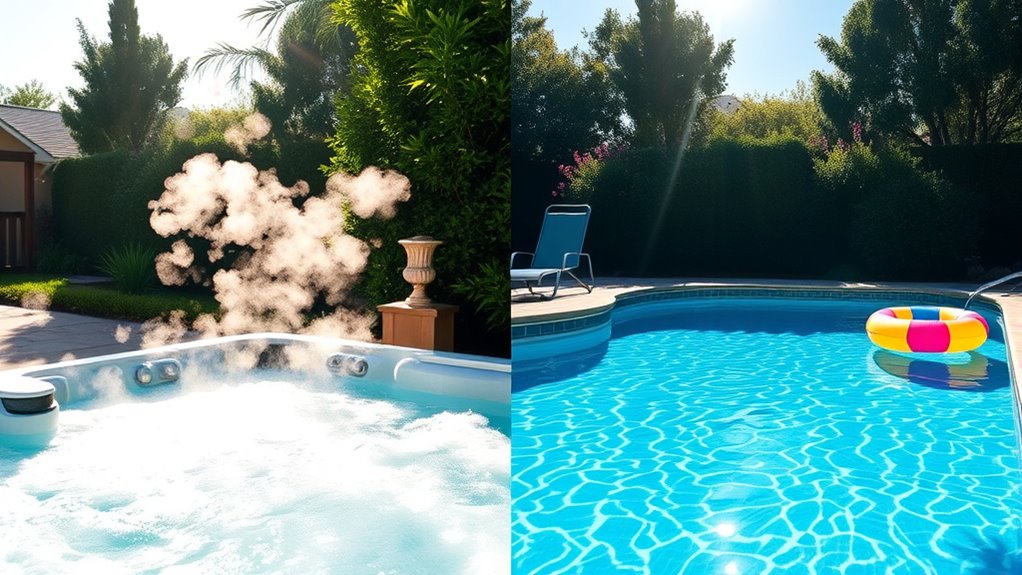
While both hot tubs and pools are popular recreational features, their usage patterns often differ throughout the year. You’re more likely to use your pool frequently during warm summer months when the weather invites outdoor swimming and lounging. Conversely, hot tubs tend to see more consistent use year-round, especially in colder seasons when the warm water offers comfort and relaxation. Think about these scenarios:
- Summer afternoons spent swimming with friends
- Cooler evenings unwinding in the hot tub
- Seasonal fluctuations in family gatherings
- Year-round comfort of a hot tub during winter
- The seasonality of each feature influences how often you use them, with pools primarily seasonal and hot tubs offering more consistent, all-year-round enjoyment. Your local climate and personal preferences shape your usage habits notably.
Health and Therapeutic Benefits

Both hot tubs and pools offer notable health benefits, especially for muscle relaxation and stress relief. Soaking in warm water helps soothe tense muscles and reduce everyday stress. Exploring how each option supports your well-being can help you choose the best fit for your needs. Additionally, selecting a dog name that suits your pet’s personality can enhance your bond and make outings more enjoyable. For those considering long-term use, understanding the safety features of each can ensure a safer and more relaxing experience.
Muscle Relaxation Benefits
Soaking in a hot tub or pool can substantially ease muscle tension and promote relaxation. The warm water increases blood flow, helping muscles recover and loosen up after a long day or intense activity. When you immerse yourself, the heat soothes aches and reduces stiffness, making movement feel easier. The buoyancy supports your body, relieving pressure on joints and muscles. As your muscles relax, you’ll notice a calming effect that can reduce soreness and prevent injury. Imagine:
- The gentle warmth melting away tightness
- Water gently supporting your limbs
- Tension dissolving with each rhythmic movement
- A calming sensation spreading through your body
This therapeutic effect makes both hot tubs and pools excellent options for muscle relief, helping you feel refreshed and less tense.
Stress Reduction Advantages
Relaxing in a hot tub or pool doesn’t just ease muscle tension—it also offers powerful stress relief. Immersing yourself in warm water helps lower cortisol levels, the hormone linked to stress, promoting a calmer mind. The soothing heat encourages relaxation, reduces anxiety, and improves your overall mood. Hot tubs, with their massaging jets, target specific tension points, providing a therapeutic experience that calms your nervous system. Pools, especially when used for lap swimming or active water exercises, can also boost endorphin production, lifting your spirits and reducing stress. Both environments give you a break from daily worries and help you unwind mentally. Whether soaking in a hot tub or swimming in a pool, you’re actively reducing stress and supporting your mental health.
Safety Features and Precautions
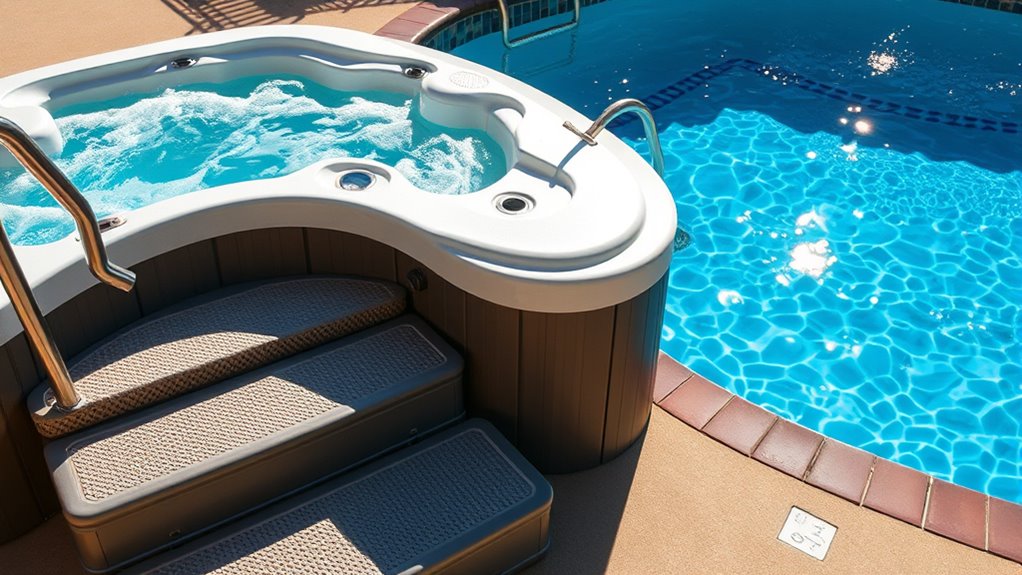
Safety features and precautions are essential considerations when choosing between a hot tub and a pool. Both require attention to safety to prevent accidents and injuries. Hot tubs often come with built-in safety locks, cover alarms, and temperature controls to avoid overheating. Pools, on the other hand, benefit from fencing, pool covers, and alarms to keep children safe. Incorporating security devices such as alarms or surveillance cameras can further enhance safety measures around large water features. Imagine a sturdy cover securely locking your hot tub when not in use, or a tall fence surrounding your pool to prevent unsupervised access. Visualize a non-slip surface around both, reducing slips and falls. Think about clear signage indicating depth and safety rules. These measures help you enjoy your water feature worry-free. Additionally, regular maintenance and safety inspections are crucial to ensure all safety devices remain functional and effective. Conducting routine safety checks can help identify potential issues before they lead to accidents. Implementing safety protocols such as emergency preparedness plans can also significantly reduce risks and ensure quick response in case of accidents. Proper training on emergency response procedures can further improve safety outcomes and ensure everyone knows how to react appropriately in an emergency.
Aesthetic Appeal and Design Options

When it comes to aesthetic appeal and design options, both hot tubs and pools offer distinct advantages that can enhance your outdoor space. Hot tubs bring a cozy, inviting look with their compact size, customizable shapes, and soothing lighting options. They often feature built-in jets, creating a luxurious ambiance. Pools provide a larger canvas for creativity, with various shapes, sizes, and materials like concrete, vinyl, or fiberglass. You can choose from elegant tile finishes, waterfalls, or unique lighting to match your style. Pools often serve as a visual centerpiece, offering a sleek, modern look or a natural lagoon feel. Both options allow you to personalize your backyard, but hot tubs excel in creating an intimate retreat, while pools make a bold design statement.
Privacy and Location Factors
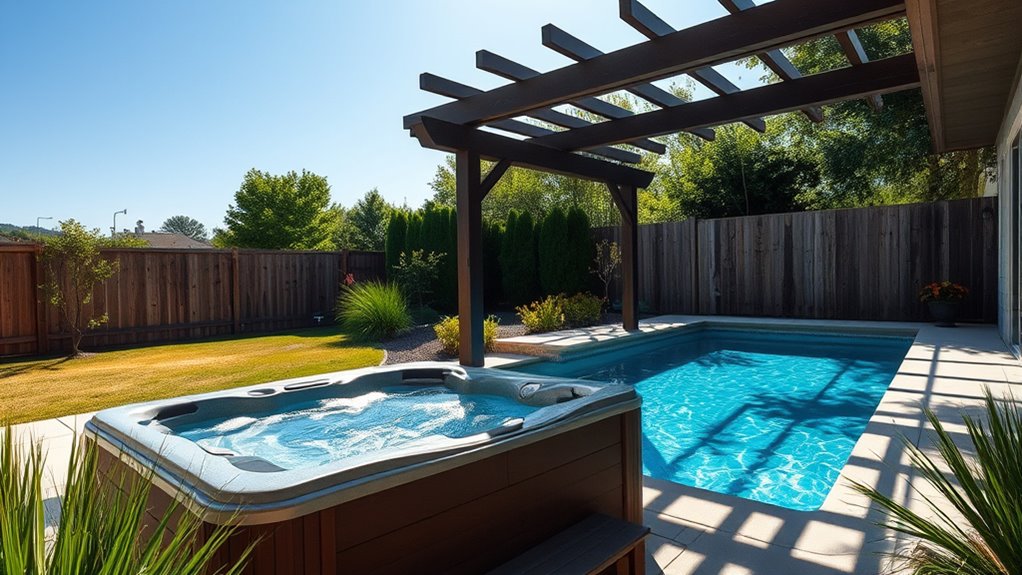
Choosing the right location for your hot tub or pool depends heavily on your privacy needs and the layout of your yard. You want a spot where you can relax without feeling exposed or overlooked. Consider how close the area is to your house and neighboring properties. Think about natural barriers like trees or fences that can provide seclusion. A corner shaded by tall hedges, offering a private retreat, can be ideal. An open yard with a view of the sunset, perfect for lounging. Near a guest bathroom for easy access and convenience. A level, stable surface away from noisy streets or foot traffic. Incorporating privacy screens or barriers can enhance seclusion and create a more intimate setting. Additionally, selecting a location with cost-effective security options ensures your outdoor space remains protected without exceeding your budget. Balancing privacy with accessibility helps ensure your outdoor oasis feels both comfortable and secluded.
Long-term Investment and Value
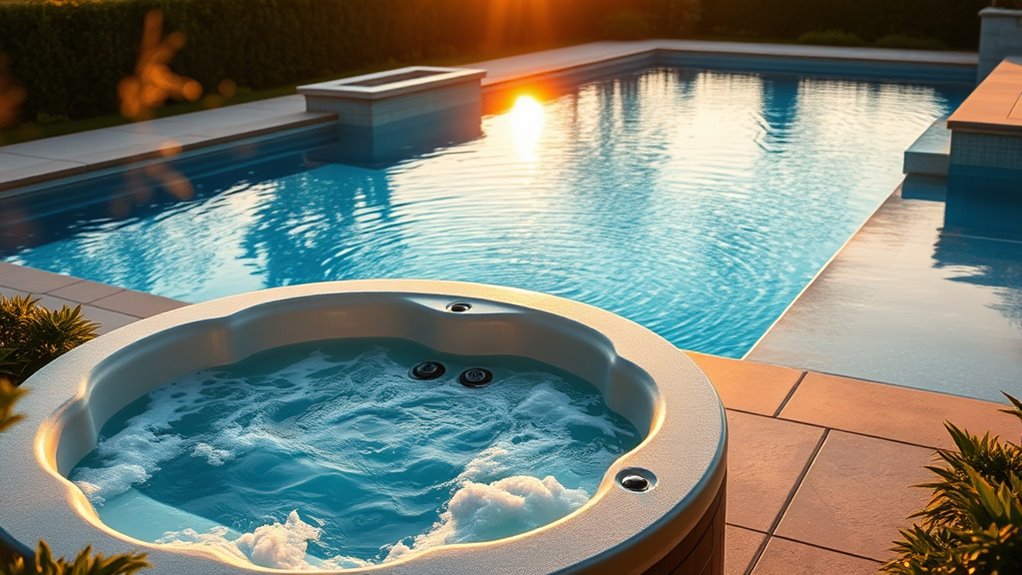
Investing in a hot tub or pool can considerably boost your property’s long-term value, especially if you select a model that complements your home’s style and your lifestyle. A well-maintained pool often increases curb appeal and attracts potential buyers, making your property more competitive. Hot tubs, on the other hand, tend to appeal to buyers seeking relaxation and luxury, adding a unique feature that can differentiate your home. Keep in mind, pools generally require higher initial costs and ongoing maintenance, which can affect your return on investment. Hot tubs usually cost less upfront and are easier to maintain. Ultimately, choosing the right option depends on your long-term goals, local market trends, and how well the feature aligns with your property’s overall appeal.
Frequently Asked Questions
Which Option Offers Better Energy Efficiency Over Time?
You’re wondering which option saves more energy over time. Generally, hot tubs use more energy because they need to heat water constantly, especially in colder months. Pools, especially those with solar covers, can be more energy-efficient since they don’t require constant heating. If you want better long-term energy savings, a well-insulated pool with a solar cover is usually the smarter choice, but hot tubs can be optimized with energy-efficient heaters.
Can Hot Tubs Be Used During Winter?
You can definitely use hot tubs during winter. They’re designed to retain heat, so even in cold weather, you’ll enjoy a warm, relaxing soak. Just make sure your hot tub has a good cover and proper insulation to keep the heat in and energy costs down. With these precautions, you’ll find winter hot tub sessions not only possible but also incredibly cozy and enjoyable.
Are There Environmental Impacts Associated With Pools or Hot Tubs?
They say, “Every coin has two sides,” and that’s true for pools and hot tubs. Both consume energy for heating, filtration, and maintenance, impacting the environment. Pools often use a lot of water and chemicals, while hot tubs require significant energy to stay warm. To minimize impacts, consider energy-efficient models and eco-friendly chemicals. Being mindful helps you enjoy your relaxation space without harming the planet.
How Do Maintenance Costs Compare Between Hot Tubs and Pools?
You’ll find that maintenance costs for hot tubs and pools differ quite a bit. Hot tubs generally cost less to maintain because they’re smaller, requiring fewer chemicals and less water treatment. Pools, being larger, need more chemicals, regular cleaning, and equipment upkeep, which can add up over time. So, if you’re watching expenses, a hot tub might be more budget-friendly in the long run.
What Are the Typical Lifespans of Hot Tubs Versus Pools?
Surprisingly, longevity isn’t just about the fun; it’s about how long your investment lasts. Hot tubs typically last 5-20 years with proper care, while pools can serve you well for 10-30 years. So, if you’re thinking long-term, consider that pools might outlast hot tubs—unless you’re okay with replacing your spa more often. Either way, regular maintenance keeps both thriving beyond their expected lifespans.
Conclusion
Choosing between a hot tub and a pool is like selecting a canvas for your outdoor masterpiece. A hot tub offers cozy warmth, symbolizing relaxation and intimacy, while a pool reflects endless possibilities and vibrant energy. Your decision shapes your backyard’s story—whether it’s a soothing oasis or a lively gathering spot. Whichever you choose, make it a reflection of your lifestyle, turning your space into a sanctuary that nurtures your happiness and well-being.
